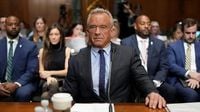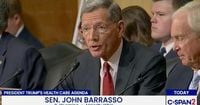Seven months into Robert F. Kennedy Jr.’s turbulent tenure as Secretary of Health and Human Services, the nation’s public health apparatus has become a lightning rod for controversy, political infighting, and a renewed national debate over the role of science in government. What began as a bold, if divisive, Cabinet appointment by President Donald Trump has now devolved into a high-stakes standoff between Kennedy’s anti-vaccine activism and a bipartisan chorus of critics—many of them former allies—who warn that his policies are undermining decades of public health progress.
According to The Washington Post, the latest flashpoint came during a Senate hearing on September 4, 2025, when Senator John Barrasso of Wyoming, himself a physician, confronted Kennedy directly: “I’m a doctor. Vaccines work. Secretary Kennedy, in your confirmation hearings, you promised to uphold the highest standards for vaccines. Since then, I’ve grown deeply concerned.” Barrasso’s remarks were echoed by fellow Republicans Bill Cassidy of Louisiana and Thom Tillis of North Carolina, signaling a growing unease within the GOP about Kennedy’s agenda and the political risks it carries.
The concerns aren’t just rhetorical. Kennedy’s decision to slash the Advisory Committee on Immunization Practices from 17 members to seven—several of whom share his skeptical views—and to abruptly fire CDC Director Susan Monarez has sent shockwaves through the public health community. As The Washington Post reported, Monarez’s ouster prompted three top CDC officials to resign in protest, and has left Congress and public health experts questioning the integrity of federal vaccine policy. Kennedy, for his part, has defended his actions as necessary to “shake up the organization,” telling Fox News, “I’ve been brought in as a new manager. My job is to shake up the organization.”
But the shakeup has come at a steep price. As AOL highlighted, Kennedy’s moves to replace mainstream vaccine panel members with skeptics or outright anti-vaxxers have drawn fierce criticism not only from Democrats, but from key figures in Trump’s own party. Senate Majority Whip John Barrasso and Senator Bill Cassidy, both physicians, have warned that Kennedy’s approach is “doing tremendous damage” to public health. Brett Giroir, a former assistant secretary for health under Trump, told The Washington Post that Kennedy’s decision to end nearly $500 million in federal funding for mRNA vaccine development was “going to make the country vulnerable.”
Meanwhile, President Trump—whose signature achievement, Operation Warp Speed, delivered COVID-19 vaccines at record speed—has found himself in a delicate position. On September 5, 2025, Trump publicly affirmed his support for vaccines, stating, “You have to be very careful when you say that some people don’t have to be vaccinated… Look, you have vaccines that work. They just pure and simple work. They’re not controversial at all. And I think those vaccines should be used.” Yet, as The Washington Post noted, Trump stopped short of directly addressing whether he still fully backed Kennedy after the bruising Senate hearing, instead praising him as “a very good person” and a “different” thinker.
The political calculus is further complicated by polling from the conservative firm Fabrizio/Ward, which warned GOP lawmakers last week that overhauling vaccine policies is a political minefield: nearly three-quarters of Trump voters believe vaccines save lives. The memo, shared with Senate Republican offices and first reported by Bloomberg News, cautioned, “Republicans should not mistake skepticism over the COVID vaccine as evidence that Republican voters are against all vaccinations. To do so would be folly. Moreover, support for vaccines is sky-high among Swing voters—the people who don’t vote along straight party lines and tend to decide close elections.”
Despite the mounting criticism, the White House has stood by Kennedy for now. Spokesperson Kush Desai insisted, “The White House maintains full confidence in Secretary Kennedy’s leadership at HHS to advance President Trump’s MAHA agenda.” Indeed, Kennedy’s “Make America Healthy Again” movement is credited by some Trump advisers as helping swing the 2024 election, and polling suggests Kennedy remains the most popular member of the Trump administration.
Yet, Kennedy’s policies have exposed deep rifts within the Republican Party and the broader public health establishment. While some, like Senators Roger Marshall of Kansas and Rand Paul of Kentucky, continue to defend Kennedy, others have joined Democrats in calling for oversight and even his resignation. Kennedy’s own family—including sister Kerry and former congressman Joe Kennedy III—have demanded he step down, as reported by AOL. Every Democrat on the Senate committee has echoed that call.
At the heart of the controversy is the question of how much control federal agencies like the CDC should wield over public health policy—and whether that control is being exercised in the public interest or for political gain. Jeffrey A. Singer, MD, writing in The New York Post on September 8, 2025, argues that the CDC’s expansion beyond its original mission—founded in 1946 to fight diseases like malaria and tuberculosis—has made it susceptible to political and special-interest pressures. Singer contends, “No federal agency, even the CDC, is immune to political, ideological or special-interest pressures… The challenge is not the occasional controversial leader—it’s the system itself.”
Recent developments suggest that states and professional organizations are beginning to push back. According to Singer, several medical societies have publicly disagreed with the CDC’s COVID booster recommendations, and states like New Mexico are working with pharmacy boards to include guidance from other reputable organizations. California, Oregon, and Washington are forming a “health alliance” to develop independent vaccine recommendations—a sign that, even in a centralized system, local and professional voices can reclaim influence over public health decisions.
Still, the immediate future is fraught. A CDC advisory panel, handpicked by Kennedy, is reviewing federal recommendations for childhood immunizations—a move opposed by many public health experts who stress the safety and efficacy of current vaccine schedules. Food and Drug Administration Commissioner Marty Makary told CNN that his agency is investigating reports of deaths following the coronavirus vaccine and plans to release a report in the “coming few weeks.”
Kennedy’s critics hope that his skepticism of coronavirus vaccines will drive a wedge between him and Trump, especially as the president’s allies seek to highlight Operation Warp Speed as a crowning achievement. Cassidy and Pfizer CEO Albert Bourla have even called for Trump to receive the Nobel Peace Prize for his efforts. Kennedy, for his part, told the Senate he agreed Trump deserved the honor, but has otherwise remained hesitant to champion the program.
As the 2026 midterm elections approach, the stakes could hardly be higher. The battle over vaccines and the future of the CDC isn’t just a policy dispute—it’s a referendum on the boundaries between science, politics, and personal freedom in American life. Both sides may be coming to realize that the system itself, rather than any one leader, is at the heart of the challenge. Whether Congress will act to restore the CDC to its original role, as Singer and others advocate, remains to be seen. For now, Americans are left to navigate a public health landscape more politicized—and more uncertain—than ever before.



